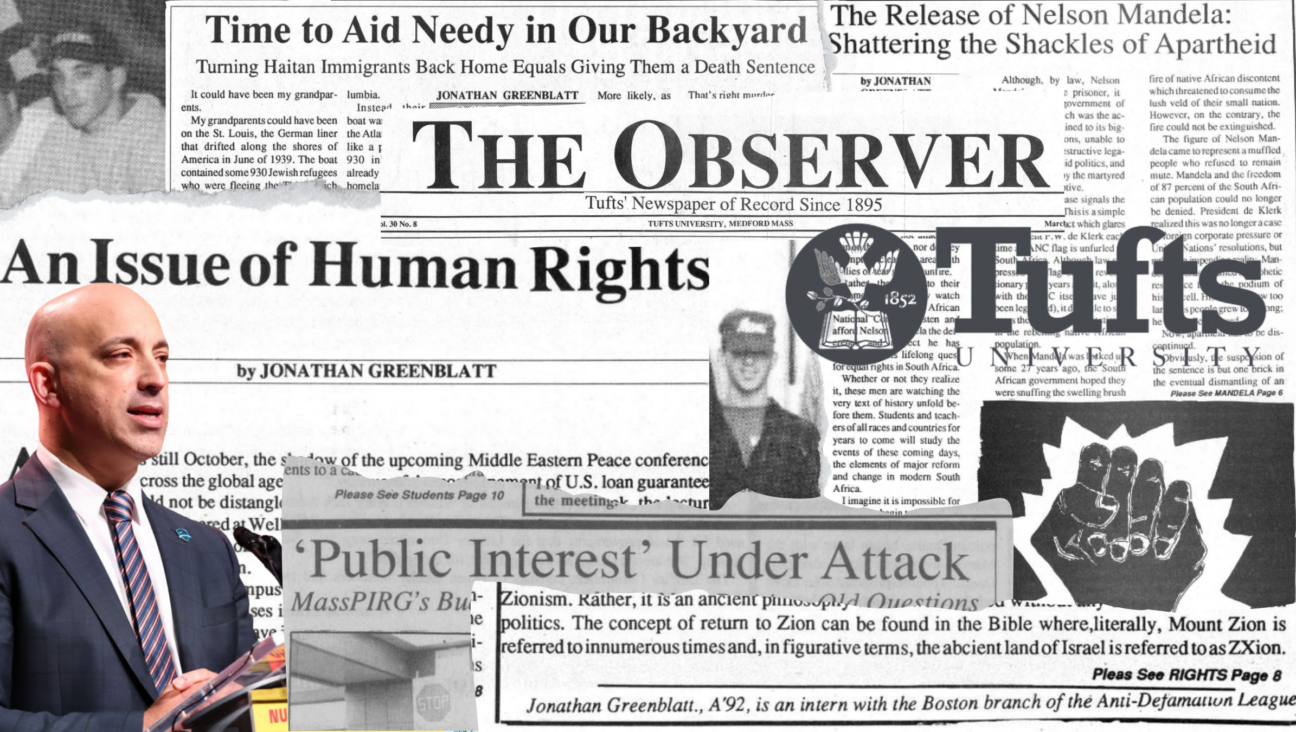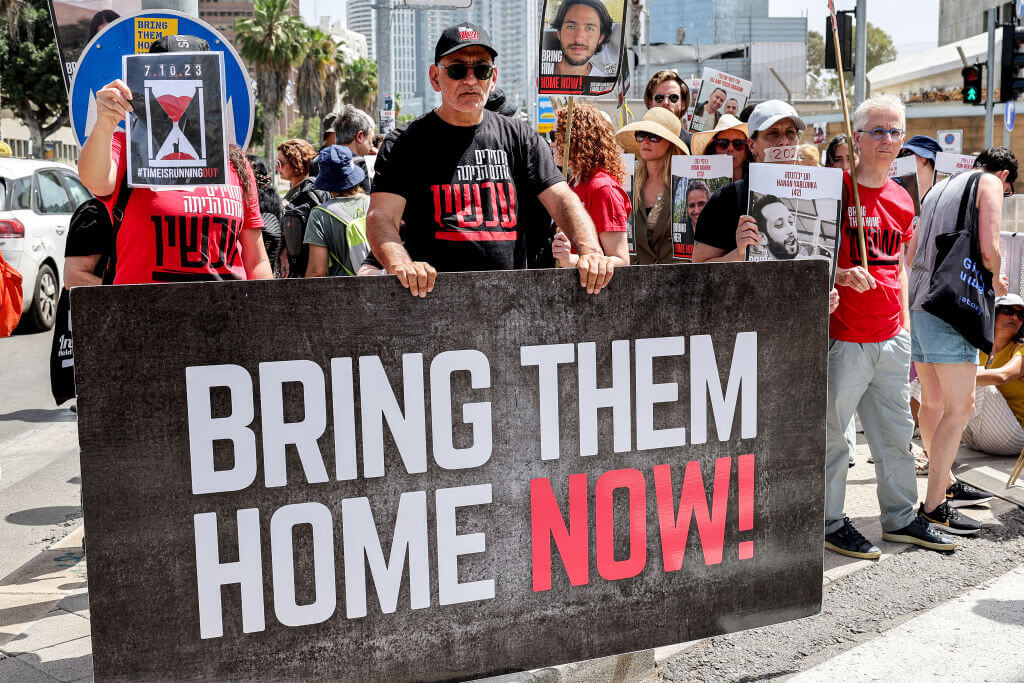Growing Gulf Between U.S. And Israeli Jews on Obama

No You Can?t: The protests that met President Obama?s recent trip to Israel indicated the extent of Israeli discontent with the American president. Image by Getty Images
He swept to power with the support of 78% of American Jews. But has Barack Obama become the bane of Israeli Jews?
A gulf between American and Israeli Jews was evident even before Obama moved into the White House. Just a third of Israelis would have endorsed him had they been allowed to vote, polling indicated, while almost half would have chosen John McCain.
In recent weeks, several public opinion surveys have suggested that Obama’s popularity has dropped far below this already low point. A Jerusalem Post-commissioned poll released on June 19 reported that only 6% of Jewish Israelis consider his views pro-Israel.
To Rafi Smith, head of the polling firm that conducted the survey, it is clear what is happening. Israelis, he said, see Obama “as the opposite of George Bush, who was perceived as the biggest friend of Israel. Obama is seen as a 180-degree turn.”
In a separate poll his Smith Research Institute conducted in May, when asked to assess George W. Bush on the same criteria of whether he was “pro-Israel,” some 88% of respondents said he was.
That May poll also suggests that Israelis have cooled significantly toward Obama since his Washington meeting that same month with Prime Minister Benjamin Netanyahu. Before that meeting, 31% of Israeli Jews viewed Obama as pro-Israel, according to the poll, which was conducted before the summit. The phrasing of the question on Obama in the May and June polls was identical.
Smith’s recent figures are stark, but there is evidence to suggest they are not freak results.
A Tel Aviv University poll conducted just before Obama’s high-profile June 4 address in Cairo to the Muslim world found that when it comes to solving the Israeli-Palestinian conflict, only 5% said he favors the Israeli side. Both polls put the percentage viewing Obama as pro-Palestinian in the 50s and the percentage viewing him as neutral in the 30s.
There has been no polling on support for Obama among American Jews since he met with Netanyahu, but a Gallup tracking poll, released May 1, put the figure at 79%, and experts believe it has not changed significantly since.
According to some, the Israeli polling leaves no room for doubt: American and Israeli Jews never have been so at odds over a president. “Israelis are dismayed by what they perceive as the generally hostile approach he has adopted in dealing with the Jewish state,” wrote Caroline Glick, one of Israel’s best-known hawkish journalists, in the June 24 edition of The Jerusalem Post.
Steven Spiegel, professor of political science at University of California, Los Angeles, also detects an ideological clash. “American Jews are more to the left on issues, and Israeli Jews, especially after the election, are more to the right,” he told the Forward, referring to the February election that brought Netanyahu to power.
In both Spiegel’s and Glick’s analysis, settlements are a real point of departure between American and Israeli Jews. Glick wrote that Israeli Jews take exception to Obama’s pressuring on settlements. Unlike American Jews, they view that pressure as “inherently hostile.”
Glick suggested that Obama’s Cairo speech was a key moment affecting Israeli public opinion — a supposition that agreement between the Tel Aviv University and Smith Research Institute polls seems to contradict — and claimed that Israelis were deeply offended by the “inference that Israel owes its existence to the Holocaust,” which was given in the Cairo address.
As for the divergence between American and Israeli Jewry, each of the two analysts sees it as a symptom of the other’s community failure to comprehend the reality of the situation.
According to Spiegel, “Israeli Jews don’t know Obama that well” and also have their opinion tainted by the fact they are “on the rebound from a love affair with Bush, so any president would have difficulties.”
In Glick’s view, the gulf in attitudes is “simply a consequence of a lack of American Jewish awareness of the significance of Obama’s positions and policies for Israel.”
But there is a different reading of the polls that challenges the notion of a major ideological clash between American and Israeli Jews. Advocates of this alternative reading point to the lack of enthusiasm in mainstream Israel for building in the West Bank — the major bone of contention between Jerusalem and Washington. Despite Israel’s shift to the right in its recent election, many experts believe that sympathy for settlers and the settlements is currently at an all-time low.
“Opinion here on the settlements is perhaps even more dovish than American Jewish opinion,” said Bar-Ilan University political scientist Jonathan Rynhold, who has just written a paper on American Jews and the peace process. “The difference is that here, you can get a missile landing on your head.”
He said that, broadly speaking, Israelis are not disturbed by Obama’s tough stance on settlements. Rather, they harbor a fear that the president may be unreceptive to Netanyahu’s concerns in general, including on defense. “The thought goes: ‘It starts with pressure on this, where will it end? It may begin with this issue on which I don’t have a problem, but could it end up with some threat to Israel’”
Alon Pinkas, a former consul general of Israel in New York who now heads the U.S.-Israel Institute at the Yitzhak Rabin Center, voiced a similar view, saying it is wrong to interpret the polls as pointing to dislike for Obama. Rather, they point to “anxiety.”
Pinkas said: “People feel uneasy about where this relationship could be going. Although they may agree with what Obama is saying at the moment, they like to know that the occupant of the White House is a firm friend of Israel, and they are unsure.”
Meanwhile, Netanyahu seems to be riding high in the polls, a rebuke to the conventional Israeli political wisdom that when the leader in Washington clashes with the leader in Jerusalem, it’s the guy in Jerusalem whom Israelis hold responsible for failing to protect the country’s most important international relationship. A Haaretz poll published shortly after Netanyahu’s mid-June address, in which he gave his conditional support for a two-state solution to Israel’s conflict with the Palestinians, found that 71% of citizens supported the speech.
Still, if the relationship is headed for more bumpy ground, many analysts suggest that it ultimately could affect Netanyahu negatively. The same Haaretz poll found that 52% expected the Netanyahu speech to improve the state’s diplomatic and international standing. Pinkas, among others, predicted that if it does not, and Netanyahu’s relationship with Obama worsens, the former’s popularity will plummet.
It remains to be seen which way the relationship will go. In a June 30 meeting between Defense Minister Ehud Barak and America’s special envoy to the Middle East, George Mitchell, Barak proposed the idea of a temporary freeze on Jewish settlements in the West Bank in exchange for greater Arab support for the peace process and acceptance of Israel. The Americans offered no immediate reaction, but Mitchell is now committed to meeting in Netanyahu for further discussions on his next trip to the region.
In the meantime, some hope that American Jews will temper their enthusiasm for Obama based on doubts voiced about him in Israel. Glick said that an “awareness campaign” by Israel advocacy organizations could raise concerns about Obama “with Israel’s core American Jewish supporters” and “would no doubt go a long way in energizing them to challenge the administration on its positions vis-à-vis Israel.”
But according to Spiegel, any such effort would prove fruitless. “His popularity among Israelis does not matter to Americans, who simply think they know him better.’”
A similar [response is heard among activists and lobbyists who are putting their hopes in Obama to advance the peace process. M.J. Rosenberg, director of policy analysis for Israel Policy Forum, said: “American Jews care as little about what Israelis think of our leaders as Israeli Jews care about what American Jews think of their leaders.”
Contact Nathan Jeffay at [email protected]

I hope you appreciated this article. Before you go, I’d like to ask you to please support the Forward’s award-winning journalism this Passover.
In this age of misinformation, our work is needed like never before. We report on the news that matters most to American Jews, driven by truth, not ideology.
At a time when newsrooms are closing or cutting back, the Forward has removed its paywall. That means for the first time in our 126-year history, Forward journalism is free to everyone, everywhere. With an ongoing war, rising antisemitism, and a flood of disinformation that may affect the upcoming election, we believe that free and open access to Jewish journalism is imperative.
Readers like you make it all possible. Right now, we’re in the middle of our Passover Pledge Drive and we still need 300 people to step up and make a gift to sustain our trustworthy, independent journalism.
Make a gift of any size and become a Forward member today. You’ll support our mission to tell the American Jewish story fully and fairly.
— Rachel Fishman Feddersen, Publisher and CEO
Join our mission to tell the Jewish story fully and fairly.
Only 300 more gifts needed by April 30






















